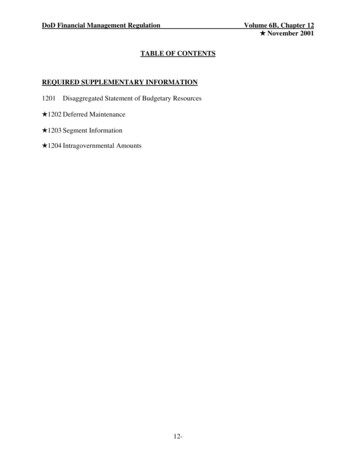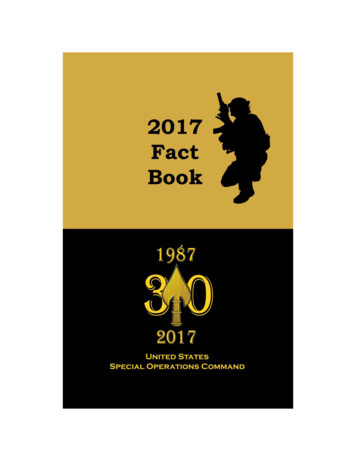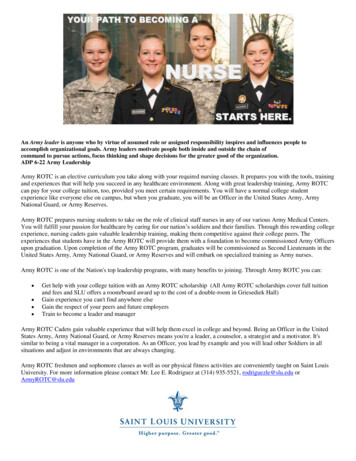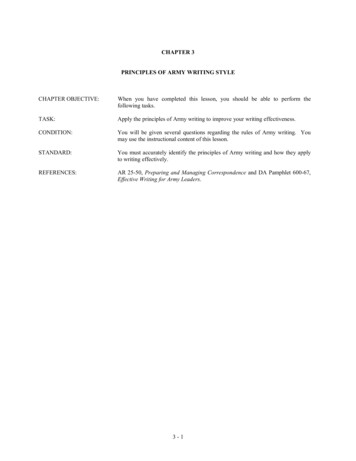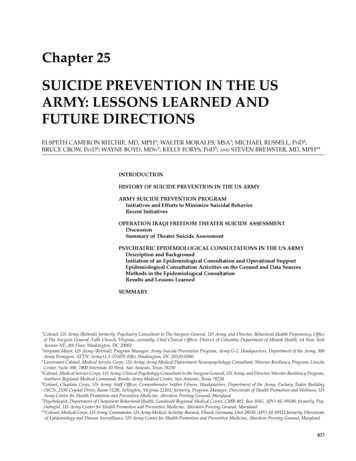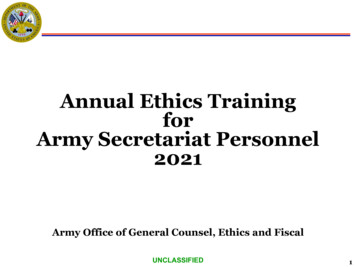
Transcription
Annual Ethics TrainingforArmy Secretariat Personnel2021Army Office of General Counsel, Ethics and FiscalUNCLASSIFIED1
APPLICABILITY Army Secretariat personnel may complete this module tosatisfy their annual ethics training requirement, whererequired. To receive credit, Army Secretariat employees must emailtheir certificate of completion to Army OGC as instructedat the end of the presentation. Caution: If you are not an Army Secretariat employee,check with your servicing ethics office before taking thetraining to ensure that office will accept this presentationin satisfaction of your annual training requirement. Donot email your certificates of completion to Army OGC asinstructed at the end of the presentation. Non-ArmySecretariat employees seeking credit for completing thistraining must provide their certificates of completion totheir servicing legal office, not Army OGC.UNCLASSIFIED2
APPLICABILITYThis module should be completedduring official business hours so thatyou may contact an ethics official ifyou have any questions.Test questions at the end of thepresentation.UNCLASSIFIED3
PURPOSE This training is designed for use by ArmySecretariat employees to satisfy their annualethics training requirement, preferably whenthey cannot attend a live ethics training session. The intent of this module is to help Armypersonnel better understand their responsibilityto foster and encourage an ethical workplace. Specifically, you are encouraged to think aboutthe ethical culture in your organization and yourcontributions towards that culture.UNCLASSIFIED4
LEARNING OBJECTIVES General Principles of Public ServiceEthical Decision MakingPolitical ActivitiesNon-Federal EntitiesGiftsConflicts of InterestImpartiality in Performing Official DutiesFinancial Disclosure ReportsMisuse of PositionUse of Government ResourcesOutside Activities / EmploymentPost-Government EmploymentUNCLASSIFIED5
GENERAL PRINCIPLES OFPUBLIC SERVICE DOPlace loyalty to the Constitution, thelaws, and ethical principles aboveprivate gain.Act impartially to all groups, persons,and organizations.Protect and conserve Federalproperty.Disclose waste, fraud, abuse, andcorruption to appropriateauthorities.Fulfill in good faith your obligationsas a citizen, and pay your Federal,State, and local taxes.Comply with all laws providing equalopportunity to all persons, regardlessof their race, color, religion, sex,national origin, age, or handicap. DON’TUse public office for private gain.Use nonpublic information tobenefit yourself or anyone else.Solicit or accept gifts from personsor parties that do business or seekofficial action from DoD (unlesspermitted by an exception).Make unauthorized commitments orpromises that bind the Government.Use Federal property for other thanauthorized activities.Take jobs or hold financial intereststhat conflict with your Governmentresponsibilities.Take actions that give theappearance that they are illegal orunethical.UNCLASSIFIED6
ETHICAL DECISION MAKINGAlways ask yourself these questions when making adecision: Do the ethics rules permit me to take a proposedaction?o May I proceed?o If yes, SHOULD I proceed? Just because acourse of action is legal does not mean it is agood idea. What are the benefits to DoD if I take theproposed action and what are the RISKS ofcreating an appearance of unethical conduct?UNCLASSIFIED7
POLITICAL ACTIVITIESThe Hatch Act was passed in1939 to ensure that federalprograms "are administered ina nonpartisan fashion, toprotect federal employeesfrom political coercion in theworkplace, and to ensure thatfederal employees areadvanced based on merit andnot based on politicalaffiliation."(U.S. Office of Special Counsel)UNCLASSIFIED8
POLITICAL ACTIVITIESPolitical Activity: activity directed towardthe success or failure of a political party,candidate for partisan political office, orpartisan political group.UNCLASSIFIED9
POLITICAL ACTIVITIES Federal Employees – Hatch Act,5 U.S.C. § 7321-7326. Soldiers – DoD Directive 1344.10,Political Activities by Members of theArmed Forces.UNCLASSIFIED10
POLITICAL ACTIVITIESDoD Employees May NOT Solicit, Accept, orReceive Political Contributions.This includes:- Hosting or Serving as the POC for a fundraiser- Signing a fundraising solicitation letter- Collecting money at the door of a fundraisingevent- Soliciting funds through a phone bank(even anonymously)UNCLASSIFIED11
POLITICAL ACTIVITIESDoD Employees May NOT Use OfficialAuthority to Affect the Outcome of an Election. May not invite subordinates to campaign events May not use official title or position whileengaging political activity May not use agency resources, e.g., officialsocial media account, while engaging in politicalactivity May not use non-public information for politicalpurposesUNCLASSIFIED12
POLITICAL ACTIVITIESExamples of Prohibited Political Activity inthe Workplace (includes telework location): Buttons, Posters, Coffee Mugs, Screen Savers, etc.,that support or oppose political parties orcandidates running for partisan political office E-mailing, blogging, tweeting, posting to socialmedia, prohibited in the workplace: Even if using a personal device or email account Even if sharing or forwarding content which wasauthored by others Even if sharing or forwarding to friends or likeminded coworkersUNCLASSIFIED13
POLITICAL ACTIVITIES?UNCLASSIFIED14
POLITICAL ACTIVITIESALL DOD EMPLOYEES MAY: Place a campaign sign in the yard (exceptions foron-post housing) Place A campaign bumper sticker on a personalcar Make financial contributions to political partiesor candidates running for partisan political office Express personal opinions on candidates andissues (but maybe not a good idea in theworkplace)UNCLASSIFIED15
POLITICAL ACTIVITIESALL DOD EMPLOYEES MAY: Attend political events (but never in uniform) Participate in nonpartisan elections Assist in nonpartisan voter registration drives Sign a nominating petitionUNCLASSIFIED16
NON-FEDERAL ENTITIES Employees may voluntarily participate inactivities of non-Federal entities (NFEs) asindividuals in their personal capacities,provided they act exclusively outside the scopeof their official positions. But, an employee’s personal participation withan NFE may not be in a fiduciary role (forexample, as an officer, board member, orcommittee member) if such participationcreates a conflicts of interest that preventhim/her from performing certain official duties.UNCLASSIFIED17
GIFTS A Gift is: Any gratuity, favor, discount, entertainment, hospitality, loan,forbearance, or other item having monetary value. Includes services as well as gifts of training, transportation, localtravel, lodgings and meals, whether provided in-kind, bypurchase of a ticket, payment in advance, or reimbursement afterthe expense has been incurred.UNCLASSIFIED18
GIFTS – NEW PARADIGM§ 2635.201(b)(1) –“Employees should consider decliningotherwise permissible gifts if they believethat a reasonable person with knowledge ofthe relevant facts would question theemployee’s integrity or impartiality as aresult of accepting the gift.”UNCLASSIFIED19
GIFTS – NEW PARADIGM It is important because of what it does:– It changes the default.– It shifts the employee’s focus from “howcan I accept this,” to “should I accept this.”– It requires the employee to engage inethical decision-making. Ethics questionsoccur everyday, whether a specific rule appliesor not. Bottom Line: Ownership by the employee ofhis/her actions.UNCLASSIFIED20
GIFTS FROM OUTSIDE SOURCESGeneral Rules (5 CFR 2635.202)An employee may not, directly or indirectly: Solicit a gift from a prohibited source; Solicit a gift to be given because of theemployee's official position; Accept a gift from a prohibited source; or Accept a gift given because of the employee'sofficial position.There are exceptions, of course!UNCLASSIFIED21
GIFTS FROM OUTSIDE SOURCESProhibited SourcesRemember the 14 Principles!5 CFR 2635.101(b)(4) – GIFTS:An employee shall not . . . solicit or accept any giftor other item of monetary value from any personor entity seeking official action from, doingbusiness with, or conducting activities regulatedby the employee's agency, or whose interests maybe substantially affected by the performance ornonperformance of the employee's duties.UNCLASSIFIED22
GIFTS FROM OUTSIDE SOURCESProhibited Sources“Prohibited Source” Definition (5 CFR 2635.203(d))Any person or entity who: Is seeking official action by the employee'sagency; Does business or seeks to do business with theemployee's agency; Conducts activities regulated by the employee'sagency; or Has interests that may be substantially affectedby the performance or nonperformance of theemployee's official duties.UNCLASSIFIED23
GIFTS FROM OUTSIDE SOURCESProhibited SourcesContractor employees are ALWAYSprohibited sources!General rule – no gifts solicited or acceptedUNCLASSIFIED24
OFFICIAL POSITION? Official Position: Gift would not have been solicited,offered, or given had the employeenot held the status, authority, orduties associated with his positionUNCLASSIFIED25
GIFTS FROM OUTSIDE SOURCESExclusions (5 CFR 2635.203) – i.e., NOT GIFTS Modest items of food & non-alcoholic refreshment, not partof a meal. Items of little intrinsic value (e.g., plaques, certificates, andtrophies), intended primarily for presentation. Free attendance at an event on the day an employee isassigned to present official information. Discounts and favorable rates available to the public, allFederal personnel, or all military personnel. Rewards and prizes from contests open to the public. Anything paid for by the Government. Gifts accepted by the Government under statutory authority. Anything for which market value is paid by the employee.UNCLASSIFIED26
GIFTS FROM OUTSIDE SOURCESExceptions (5 CFR 2635.203) – i.e., GIFTS But Gifts with a value of 20 or less, not to exceed 50from the same source in a single calendar year. Gifts based on a personal relationship. Discounts and similar benefits meeting certainrequirements. Awards and honorary degrees. Gifts based on outside business or employmentrelationships.UNCLASSIFIED27
GIFTS FROM OUTSIDE SOURCESMore Exceptions (5 CFR 2635.203) Gifts customarily offered by a prospective employer. Social invitations from other than prohibitedsources. Meals, refreshments, and entertainment in foreignareas. Gifts accepted under specific statutory authority. Free attendance at widely-attended gatherings(WAG).UNCLASSIFIED28
GIFTS FROM OUTSIDE SOURCESMore on the 20/ 50 Rule: You may accept gifts valued up to 20 in value on oneoccasion (but not cash). [5 CFR 2635.204(a)] Gifts accepted from one source (e.g., one company) maynot exceed 50 in value in a calendar year. May not “buy down” gift to 20, e.g., pay 5 & accept agift worth 25. The 20 limit is per occasion and per source (e.g., at atrade show you may accept gifts worth 20 or less fromseveral different DoD contractors on the same day). Good practice – a system to track gift acceptance.UNCLASSIFIED29
GIFTS FROM OUTSIDE SOURCESMore on Widely Attended Gatherings (WAGs): Generally, an employee may not accept a giftgiven by a prohibited source (e.g., a DoDcontractor) or given because of the employee’sofficial position. A common exception to this general prohibition isthe widely-attended gathering (WAG) exception.Advance supervisory written approval required.UNCLASSIFIED30
GIFTS FROM OUTSIDE SOURCESMore on Widely Attended Gatherings (WAGs):The “Agency Designee” (generally supervisor) mustdetermine, in writing, that:1. A large number of attendees will be present.2. Diverse views will be represented.3. There will be an opportunity to exchange views.4. There is an agency interest in the subordinate’sattendance.5. The agency’s interest in the employee’s attendanceoutweighs the concern that the employee may appear to beimproperly influenced in the performance of officialduties.NOTE: If Approved, MUST attend in personal capacity(leave/liberty) and may NOT use Government transportation.UNCLASSIFIED31
GIFTS BETWEEN EMPLOYEESGeneral Rule: Employees shall not:1. Give or donate toward a gift for a superioror ask another employee to donate towardsa gift to either his own superior or that ofanother; or2. Accept a gift from a lower-paid employee(unless the donor and recipient arepersonal friends who are not in an officialsuperior-subordinate relationship).UNCLASSIFIED32
GIFTS BETWEEN EMPLOYEESExceptions:1. Unsolicited gifts on traditional gift givingoccasions, such as holidays or birthdays, valuedat 10 or less (no cash).2. Food and refreshments that will be consumed atthe office.3. Personal hospitality (e.g., meals) at someone’shome.4. Customary gift when you invite a subordinate toyour home for a meal.UNCLASSIFIED33
GIFTS BETWEEN EMPLOYEESMore Exceptions:5. Hostess gifts in connection with the receipt ofpersonal hospitality (e.g., dinner party invite).6. Unsolicited gifts on special infrequent occasions:a) Wedding, illness, birth of a childb) An occasion that terminates the officialsuperior – subordinate relationship (e.g.,transfer, retirement, resignation), but notpromotion.NOT: Promotions, Birthdays, or AnniversariesUNCLASSIFIED34
GIFTS BETWEEN EMPLOYEESRules: Gifts for “special infrequent occasions:” Gift must be “appropriate to the occasion.” May not accept a gift on these occasions from agroup that includes a subordinate if valued atover 300. (Contractors may NOT contribute) Do not include cost of food, refreshments, andentertainment provided to mark the occasion. Suggested voluntary donation may not exceed 10 (although all may give as much as desired). Gift to spouse to mark this occasion must beattributed to the employee.UNCLASSIFIED35
CONFLICTS OF INTEREST Statutory Provision - Criminal(18 U.S.C. § 208) Impartiality – RegulatoryProvision (5 C.F.R.§2635.502) Financial DisclosureUNCLASSIFIED36
CONFLICTS OF INTEREST –Statutory Provision (18 USC § 208)18 U.S.C. § 208 generally prohibits an employeefrom personally and substantially participating in aparticular matter involving specific parties inwhich he (or anyone or any entity whose interestsare imputed to him) has a financial interest, if theparticular matter will have a direct andpredictable effect on that interest.UNCLASSIFIED37
CONFLICTS OF INTEREST –Statutory Provision (18 USC § 208)The interests of the following individuals areimputed to you for 18 U.S.C. § 208 purposes: You Your minor children Your spouseREPORT THE SOURCE OF SPOUSALNON-FEDERAL INCOME OVER 1000ON THE FINANCIAL DISCLOSURE FORM!UNCLASSIFIED38
CONFLICTS OF INTEREST –Statutory Provision (18 USC § 208)The interests of the following entities are imputedto you for 18 U.S.C. § 208 purposes: Your general partner (a "general partner" is aperson who joins with at least one other personto form a business) An organization with which you are negotiatingan arrangement for future employment An organization for which you serve as employee,officer, director, trustee, or general partnerUNCLASSIFIED39
CONFLICTS OF INTEREST –Statutory Provision (18 USC § 208)What is a particular matter? Focused upon the interests of specific persons(includes contractors), or a discrete andidentifiable class of persons (includingcontractors). Does not extend to broad policy making orconsiderations directed toward the interest of alarge and diverse group of persons or entities. Hint: Can you identify who is involved?UNCLASSIFIED40
IMPARTIALITY – RegulatoryProvision (5 C.F.R. §2635.502)Absent supervisory notice and authorization,an employee should not participate in anyofficial matter: That is likely to have a direct and predictableeffect on the financial interests of a memberof the employee’s household; or Where a person with whom the employee hasa covered relationship is, or represents, aparty to the matter.UNCLASSIFIED41
IMPARTIALITY – RegulatoryProvision (5 C.F.R. §2635.502)Reasonable Person Testfor Appearance of ImpartialityIf a reasonable person with knowledge of the relevantfacts would question the employee’s impartiality, theemployee should consult with his/her supervisorbefore participating in the matter.UNCLASSIFIED42
IMPARTIALITY – RegulatoryProvision (5 C.F.R. §2635.502)Covered Relationships Include: A member of your household or a relative withwhom you are close; Someone with whom you have or seek to have abusiness relationship other than a routineconsumer transaction (e.g., landlord / tenant); An organization (other than political party) inwhich you actively participate; Someone with whom your spouse, parent, ordependent child has (or seeks to have) a closebusiness relationship, such as partnership oremployment.UNCLASSIFIED43
FINANCIAL DISCLOSURE REPORTSThe Primary Screen forPotential Conflicts of Interest OGE 450 filers - Use the Financial DisclosureManagement program athttps://www.fdm.army.mil OGE 278e filers – Use Integrity athttps://www.integrity.gov Supervisor review is crucial! Best BusinessPractice - complete review within two weeks.UNCLASSIFIED44
FINANCIAL DISCLOSURE REPORTSNew Entrant Reports: For any employee who is:1) starting a position requiring financial disclosurefiling, or2) assigned duties requiring financial disclosurefilingNew Entrant Reports must be completed within 30days from appointment to this position, or fromstarting the newly assigned duties.Check the position description to see if the positionrequires financial disclosure reporting.UNCLASSIFIED45
FINANCIAL DISCLOSURE REPORTSAnnual Reports Annual OGE 450, Confidential Financial DisclosureReport, due 15 February For O-6/GS-15 and below whose duties involvepotential conflicts of interest with personal assets Look at position description Annual OGE 278e, Public Financial DisclosureReport, due 15 May All GOs, SESs, Schedule Cs, and PoliticalAppointees (PAs, PASs)UNCLASSIFIED46
FINANCIAL DISCLOSURE REPORTSWho Files a Public Financial Disclosure ReportOGE 278e? OGE 278e filers: All GOs, SESs, Schedule C Employees,Political Appointees (PAs, PASs) Must file a Termination report within 30 daysafter departing Federal service. 200 fee for late OGE 278e filing.UNCLASSIFIED47
FINANCIAL DISCLOSURE REPORTS278e Filers Must Report TransactionsPeriodic Transaction Reports OGE Form 278-T All 278e filers must report purchases, sales, orexchanges greater than 1000 of: StocksBondsCommodities futuresAny other form of security (but not mutualfunds)UNCLASSIFIED48
FINANCIAL DISCLOSURE REPORTSOGE 278e Filers:Periodic Transaction Reports OGE Form 278-T Must also report for spouse, dependent child,and any security where employee is owner orpartial owner. Due by the earlier of 1) 30 days after actualnotice of the transaction or 2) 45 days after thetransaction. Use Integrity to file this report. Monthlyreminder available.UNCLASSIFIED49
MISUSE OF POSITIONAn employee shall not use his public office for hisown private gain, for the endorsement of anyproduct, service or enterprise, or for the privategain of friends, relatives, or persons with whomthe employee is affiliated in a nongovernmentalcapacity, including nonprofit organizations ofwhich the employee is an officer or member, andpersons with whom the employee has or seeksemployment or business relations.UNCLASSIFIED50
MISUSE OF POSITION:ENDORSEMENTS “Endorsement of a non-Federal entity, event,product, service, or enterprise may be neitherstated nor implied by DoD or DoD employees intheir official capacities.” [DoD 5500.07-R,para. 3-209] Example: No wearing uniform while starring ina [insert name of favorite beer] commercial –implies Army endorsement.UNCLASSIFIED51
MISUSE OF POSITION:CONTRACTOR ISSUES It is a misuse of position to endorse nonFederal entities (NFEs), to include contractors.5 C.F.R. 2635.701-702 An employee shall not use or permit the use of hisGovernment position or title in any manner thatcould reasonably be construed to imply the agencysanctions or endorses the employee’s personalactivities or those of another.UNCLASSIFIED52
MISUSE OF POSITION:CONTRACTOR ISSUESLetters of Recommendation: Endorsement rules prohibit use of officialposition, title or authority, includingcertificates of achievement, official stationery,and “star notes,” to commend the contractrelated performance of a contractor or of acontractor employee. Another example of improper endorsement:recommending a contractor or contractoremployee for a grant.UNCLASSIFIED53
MISUSE OF POSITION:CONTRACTOR ISSUESMore on Letters of Recommendation: You may write a letter of recommendation or characterreference in your personal capacity, i.e., if you don’t useofficial stationery or your official title. You may write a letter of recommendation or characterreference in your official capacity, i.e., you may use officialstationery and your official title, if: You receive a request for the letter or reference, You have personal knowledge of the ability or character ofthe individual, and You have dealt with the individual in the course of yourFederal employment, or you are recommending theindividual for Federal employment. [5 CFR 2635.702(b)]UNCLASSIFIED54
MISUSE OF POSITION:CONTRACTOR ISSUESDoDI 1400.25-V451, November 4, 2013, states: “Awards, award programs, ceremonies, or receptionsto acknowledge contributions by organizations orcompanies having a commercial or profit-makingrelationship with DoD must not be established.” Seeparagraph 3(h). “To avoid issues in connection with contractualrelationships and obligations, actual or perceivedconflicts of interest, and actual or perceived acts offavoritism, persons, organizations, or companieshaving a commercial or profit-making relationshipwith DoD or with a DoD Component will not begranted recognition. See Enclosure 3, paragraph11(b)(2).UNCLASSIFIED55
MISUSE OF POSITION:CONTRACTOR ISSUES The Contracting Officer (CO) or the ContractingOfficer’s Representative (COR) may provide pastperformance feedback, positive or negative, to thecontracting firm. The CO or COR may also providefeedback on past performance questionnaires. Bottom Line: It is the CO’s or COR’s (and not your)responsibility to monitor contractor employeeperformance, and award accordingly.UNCLASSIFIED56
USE OF GOVERNMENTRESOURCES Use Federal Government equipment and property,including communications systems, only for officialpurposes or authorized purposes as approved by yoursupervisor. Subject to supervisor approval, you may use Governmentresources for personal purposes IF the use: Does not adversely affect the performance of officialduties; Is of reasonable duration and frequency; Serves a legitimate public interest (such as keeping theemployee at their desk); Does not reflect adversely on DoD; and Creates minimal or no significant additional cost toDoD.**WARNING: You should also check other regulations or policies applicable toparticular categories of resources (e.g. – JTR, IT regulations, etc.). Even thoughpersonal use may not violate the ethics rules, it may violate these.**UNCLASSIFIED57
USE OF GOVERNMENT RESOURCES:CONTRACTOR ISSUES Contractor employee time government resource Contractor employees work on clockcontrolled by contractor supervisor –not gov’t supervisor Leave and other time off controlled bycontractor supervisor Holidays and other time off governed bycontract, not gov’t supervisor Federal Government supervisors may notauthorize “59 Minute Rule” and trainingholiday paid absences for contractorsUNCLASSIFIED58
OUTSIDE ACTIVITIES /EMPLOYMENTDoD Financial Disclosure Filers (OGE 450and 278e) MUST obtain written approvalfrom the supervisor before engaging in abusiness activity or compensated outsideemployment with a prohibited source.UNCLASSIFIED59
OUTSIDE ACTIVITIES /EMPLOYMENT The activity/outside employment requiring writtenapproval could include: Adjunct professor duties at local university Fiduciary position with private organization thatconducts business with or seeks support from DoD(e.g., AUSA, AAAA, Signal Assn.; but not localschool board, soccer club, or homeowners assn.) Attach written approval to current financialdisclosure report in FDM. Army Attorneys: No outside practice of law withoutGeneral Counsel approval.UNCLASSIFIED60
OUTSIDE EMPLOYMENT:WORKING ON TRANSITION LEAVE Military Officerso May generally begin civilian employment &draw salary in transition leave status BUT!o No working for support contractor ingovernment office, or interacting withFederal personnel on behalf of the newemployer, during transition leave.Violates both 18 U.S.C. §§ 203, 205, Representing newemployer to Government while on ADUNCLASSIFIED61
OUTSIDE EMPLOYMENT:WORKING ON TRANSITION LEAVE Same statutes apply to outside employment.o No representing the outside business back to theFederal government. Violates both 18 U.S.C. §§ 203, 205 - Representing newemployer to Government while a full-time Federalemployee Includes contracts with Federal governmento No compensation for representational services onbehalf of a private entity/person rendered to theFederal government, either personally or byanother, at a time when the employee worked forthe Federal government.UNCLASSIFIED62
POST-GOVERNMENT EMPLOYMENT(PGE) SeekingEmployment inAnticipation ofRetirement orSeparation RepresentationalBansUNCLASSIFIED63
PGE: SEEKING EMPLOYMENT If you are seeking non-Federal employment(sending resumes to select employers), you maynot do Government work on a particular matterthat will affect the financial interests of yourprospective employer(s). You must request thatyour supervisor allow you to disqualify yourselffrom performing these duties. There are restrictions that will apply to youractivities in the private sector in light of yourspecific duties and level of responsibility as aGovernment employee. Always consult your ethics counselor beforeseparating from the Government.UNCLASSIFIED64
PGE: REPRESENTATIONAL BANS18 U.S.C. § 207After leaving the Federal Government,former employees are subject to additionalCRIMINAL restrictions that may limit theirinteractions with the Federal Governmentwhen representing the interests of anotherperson or entity.UNCLASSIFIED65
PGE: RESTRICTIONSOther PGE restrictions include: NDAA 2008 section 847 Procurement Integrity Act The Stop Trading on CongressionalKnowledge Act (STOCK Act) NDAA 2018 section 1045UNCLASSIFIED66
PGE ADVICE LETTERSSection 847 of the 2008 NDAA requires certain current and former DoD personnel to request written postemployment advice if they expect to receive compensation from a DoD contractor within the two-year periodfrom the date they left the Government.“Covered DoD officials” either:1. Currently hold, or held when they left the Department, one of the following positions: 1)Executive Schedule, which is one appointed by the President and confirmed by the Senate; 2) SeniorExecutive Service; or 3) general or flag officer position (grade 0-7 and above) (not frocked); andparticipated personally and substantially at the time of service in one of the above positions in an acquisitionwith a value in excess of 10 million; Or2. Currently serve, or served when they left the Department, in one of the following positions:program manager, deputy program manager, procuring contracting officer, administrative contractingofficer, source selection authority, member of the source selection evaluation board, or chief of a financial ortechnical evaluation team for a contract in excess of 10 million.How to Get: Opinions must be requested and issued in AGEAR system (on the FDM home page).DoD contractors may not pay you until you receive the opinion or 30 days have passed since yousubmitted a complete request, whichever occurs first.You must have actual offer of employment or compensation to request a Section 847 opinionUNCLASSIFIED67
Final ExamUNCLASSIFIED68
Final Exam Q#1NFE Scenario:Ms. Smith DASA (Widgetry) (DASA(W)) is the vice-presidentof the American Society of Military Widgeteers (ASMW), anNFE. The ASMW offered her this position the day she wasappointed DASA(W). The previous two DASA(W)s held thisposition before ASMW offered her this position.Question:May she accept this position without running afoul of ethicsprovisions?YesNoUNCLASSIFIED69
Final Exam Q#1Yes is incorrect.It appears that ASMW offered Ms. Smith thevice-president position based on her officialDASA(W) position. While DoD employees mayvoluntarily participate in NFE activities intheir personal capacities, they may not servein a personal capacity as an NFE officer orsimilar position offered because of the DoDposition (DoD 5500.07-R, para. 3-301).UNCLASSIFIED70
Final Exam Q#1The correct answer is No.It appears that ASMW offered Ms. Smith thevice-president position based on her officialDASA(W) position. While DoD employees mayvoluntarily participate in NFE activities intheir personal capacities, they may not servein a personal capacity as an NFE officer orsimilar position offered because of the DoDposition (DoD 5500.07-R, para. 3-301).UNCLASSIFIED71
Final Exam Q#2NFE Scenario:COL Jones is the vice-president of the local chapter ofthe Association of the Army of the United States(AAUS), an NFE. The AAUS chapter is sponsoring aconference at the same installation where COL Jonesworks.Question:May COL Jones direct his Soldiers to set up for thelocal conference during the duty day?YesNoUNCLASSIFIED72
Final Exam Q#2Yes is incorrect.DoD employees [to include Soldiers] “may notbe used to support the unofficial activity ofanother DoD employee in support of nonFederal entities, nor for any other non-Federalpurposes” (DoD 5500.07-R, para. 3-303b). NOTE: “Certain organizations have specialrelationships with DoD or its employeesspec
This training is designed for use by Army Secretariat employees to satisfy their annual ethics training requirement, preferably when they cannot attend a live ethics training session. The intent of this module is to help Army personnel better understand their responsibility to foster and encourage an ethical workplace.

